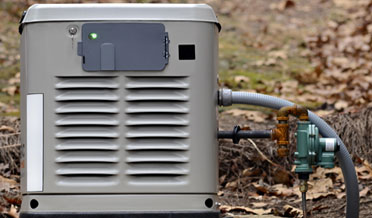5 Tips to Choose the Right Home Generator
Guidelines for Choosing a Home Generator
Have recent weather events left you considering a generator for your home? Power outages have become a very real possibility, and in our experience being without power for long periods of time is uncomfortable and potentially unsafe. If you are considering a generator for your home, you know there are many options. Where do you start? Here are some guidelines to help you begin to make a decision.
Home Generator Basics
Generators are temporary replacement power sources, a standby electrical supply. While they can provide electricity to your home while the power grid is down, it is doubtful you will generate enough electricity to power the entire house. You will need to prioritize circuits, separating between essential and non-essential; perhaps the refrigerator, computer, HVAC, and lighting go on the essential list, while the washing machine, dryer, and outlets might be on the non-essential list.
Generators convert mechanical energy into electrical energy. The process is the same as large electric generation plants, only on a smaller scale. A fuel powers an engine that spins a shaft. The spinning shaft produces a magnetic field that produces electricity.
Types of Home Generator
Stationary and Portable Home Generator
The principal difference in generators is their position. Some generators are portable, can be stored and brought out as needed. Since they are mobile, they can be moved from one location to another, refueled as needed, or connected to a fuel line. However, these smaller units have limited power generation and must be frequently refueled. With a widespread power outage, finding fuel might be a problem.
Stationary generators, on the other hand, are larger, more powerful, and are therefore installed permanently. It can be set to start immediately upon loss of power. Generally, it will be wired directly to the electric service panel and connected to the natural gas line, a fuel source that is more reliable in a power outage. The unit will be installed outside the house on a pad (keeping the exhaust outside of your home), and local regulations may require it to be elevated.
Fuel Source
Generators run on a variety of fuel sources because not all fuels are available locally. Portable generators often use gasoline, but with a smaller tank, they will need to be filled several times per day. Since stationary units may be connected to a steady supply of fuel, you will find generators that use a wider list of fuels: diesel, natural gas, propane, or fuel oil. Your choice of generators will need to take into consideration the availability of fuel in your location.
Home Generator Size
Generators come in sizes that range in output from 1 kilowatt/hour (kWH) to 100 kilowatts per hour. Of course, the cost will be determined, in part, by the power output. The output of your generator will determine the load it can supply to power your home’s electrical needs. You will need to compare the total kWh needed for emergency use in your home to the kWh output of the generator you choose.
VERY IMPORTANT
When a generator is in use, it must be connected through a transfer switch, not directly to the service panel. This switch prevents the electricity your generator is producing from flowing backward (feedback) onto the power grid. Feedback can be deadly for utility repair crews and attaching a generator to your home without a transfer switch is both dangerous and illegal. The transfer switch will also protect your generator from damage that might be caused by the return of electricity from the power grid. Talk with your electrical professional about the size and function of a transfer switch.
Want to Learn More About Choose the Right Home Generator?
Our four decades of experience as a Houston Electrician and contractor AirPro Houston provides you with the skill and expertise for Guidelines for Choosing a Home Generator.
We have financing options available with great options with up to 72-month terms with approved credit. Call us today at 281-880-8805 and let us partner with you for all of your electrical repair and installation needs.
